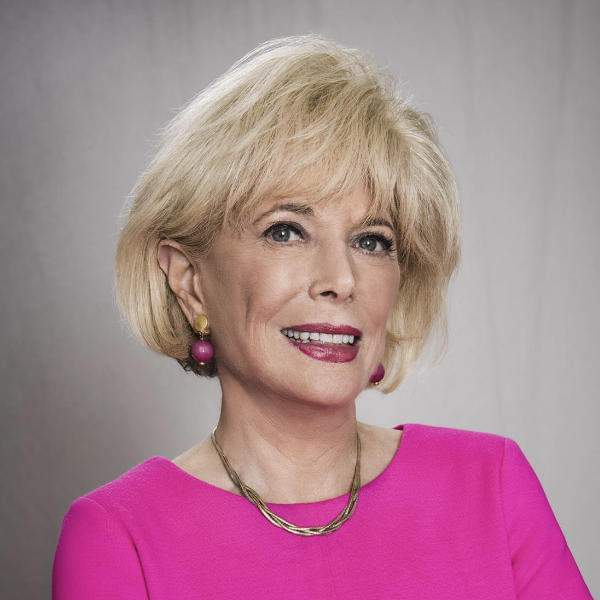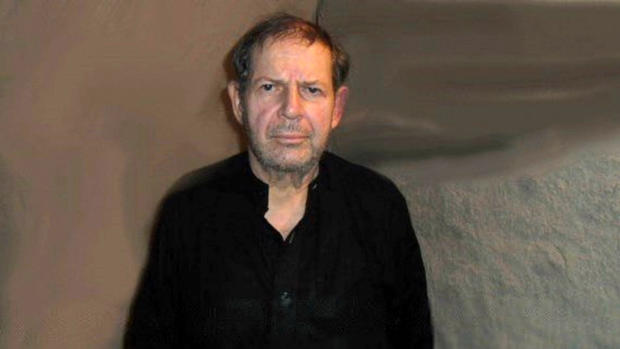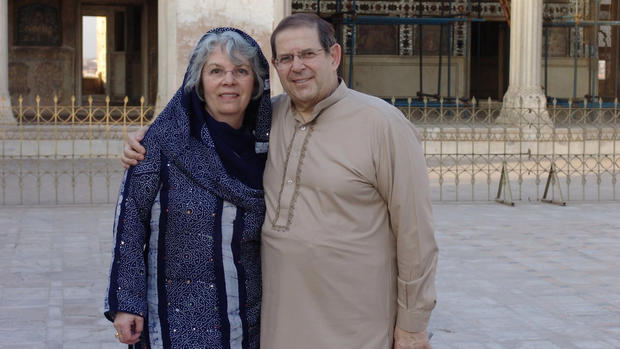The Hostage
The following is a script from "The Hostage" which aired on Feb. 21, 2016. Lesley Stahl is the correspondent. Habiba Nosheen and Ira Rosen, producers.
Three days before American aid worker Warren Weinstein was scheduled to return home from Pakistan, he was abducted and held hostage for the next three and a half years during which time a delicate negotiation took place to secure his release.
Since 9/11 there have been at least 80 Americans taken hostage by terrorist groups. Many of the families negotiate for their release, and the details of those talks are mostly kept secret. But 60 Minutes has obtained hundreds of calls, videos and chat messages in the Weinstein case that reveal the desperation of a hostage family under that kind of stress.
Weinstein was in Pakistan as a contractor with the U.S. government working to help poor families improve their lives. The negotiations for his release were not led by the government but by Weinstein's then 68-year-old wife, who lived thousands of miles away in Rockville, Maryland.
Warren Weinstein: Listen a lot has happened. I am in custody of these people. I think we have to trust them.
When 70-year-old Warren Weinstein was kidnapped at gunpoint in August 2011, he was dragged, bleeding, from his house, here in Lahore. His wife Elaine would not know if he was alive for seven months. Then one early morning she got a call from the kidnappers. They put Warren on the phone.
Elaine Weinstein: The first thing he said to me was, "I'm sorry I did this to you."
Warren Weinstein: I am sorry I did this to you.
Elaine Weinstein: Don't say anything. Don't say that.
Warren Weinstein: OK.
Elaine Weinstein: We miss you, we'll do anything to get you safe. Tell them not to touch you, to take care of you. (beep beep beep) He's gone.
"The first thing he said to me was, 'I'm sorry I did this to you.'"
Elaine Weinstein: The first thing he says to me, not, "Get me the hell out of here," but, "I'm sorry I did this to you." I mean-- that I will never forget.
They'd been married for 46 years, had two daughters and two grandchildren. Warren often lived abroad without Elaine, doing economic development work in places like Burundi and Cameroon, learning the local language and adopting the garb and customs of the country.
They were not wealthy and when the kidnappers demanded four million dollars for his release, she was shocked.
Lesley Stahl: Could you afford that?
Elaine Weinstein: No.
Lesley Stahl: Could you come close?
Elaine Weinstein: No. But if I needed $4 million, I would've come up with it. It's my husband's life.
Elaine contacted the FBI which sent a team of negotiators that advised her to counter the kidnappers' $4 million ransom demand by starting low. She says they suggested $250.
Elaine Weinstein: What do I know about negotiating with these people? I don't have a clue. They told me this is what you should do. I thought $250 was insulting.
So instead, her first counter proposal was $21,820. The kidnappers wrote back in chat messages: "No, it is not possible..." "It is very low. It look like... you don't want to free Warren."
The FBI, present during these exchanges, was walking a fine line. Paying ransom demands that could be used to fund terrorists operations is a federal offense.
Lesley Stahl: It is actually against the law for a citizen like you to give money to a terrorist.
Elaine Weinstein: Right.
Lesley Stahl: And the FBI was facilitating it?
Elaine Weinstein: Yes.
Lesley Stahl: Now how does that happen?
Elaine Weinstein: The FBI said to me in the beginning, "It is against the law for you to pay a ransom for your husband. But nobody has ever been prosecuted for that."
Elaine had hired an experienced hostage negotiation firm that was working with the FBI to advise her.
Elaine Weinstein: As far as I was concerned, give 'em the money. And I kept, "Well, can't we just give 'em the money?"
Lesley Stahl: All of it?
Elaine Weinstein: Yeah, I'm-- hey, "Give 'em the money. Let's get this over with. Give 'em the money."
But it wasn't that simple. Before turning over any money, Elaine was told to get confirmation that Warren was still alive.
She asked for "proof of life." She wanted a detail that only warren would know.
They wrote back in broken English quoting warren: "I look forward to a star day dime some with her...'' Elaine had no idea what the message meant.
Elaine Weinstein: And then the agent on my side said, "dime sime, dime, dim sum!"
Elaine Weinstein: I said, "Oh my god, that's Warren." He said we're going to have dim sum, every Sunday that he was home, we went for dim sum. Sometimes Saturday and Sunday.
Lesley Stahl: Chinese food.
Elaine Weinstein: Yeah. That was the proof of life 'cause nobody else could possibly have known these little things.
Whenever Elaine talked to the kidnappers, she'd follow notes like these from the FBi:
"Can we set up a time to talk next time? Or can I email you?"
"We both have goals. I need to know Warren is okay."
The kidnappers were getting impatient. They messaged:
"If you send the money [we] free him if you not sending the money so then we kill...him and we send you the death video of Warren"
Elaine wrote back: Please do not hurt him.
The kidnappers then upped the pressure by having Warren himself call and urge her to pay the money.
Warren Weinstein: Elaine, what they told me all along is unless they get all the money they're not going to deliver me.
To make sure the kidnappers didn't keep upping the ransom demand, she took the FBI's advice on how to answer warren that day:
Elaine Weinstein: It's very dangerous to give them the money, Warren. We won't have anything left. We will have to give them our entire life savings. They'll keep asking for money...until we have nothing left to give them. And I don't think they'll let you go.
Warren Weinstein: The guy I'm with, is saying if you give him the money, I think they'll bring me to Islamabad.
Eric Lebson: She delivered the message that she needed to deliver, even though she was listening to her husband in captivity being prodded to ask her to do something different. I don't know that I could do that.
Eric Lebson worked on President Obama's National Security staff, specializing in Pakistan. After the White House, he and his company Levick volunteered to help Elaine during the negotiations.
Eric Lebson: This is an older woman who is now living by herself, dealing with this stress, and taking phone calls at 3:00 in the morning from kidnappers holding her husband.
Logs from the hostage team show that the calls would come in waves. On one night, the records show, the kidnappers called Elaine 18 times between 1 and 6 in the morning.
Elaine Weinstein: On my mind all the time was, "You keep it together. Your husband's life is in your hands."
Lesley Stahl: And this went on for almost four years.
Elaine Weinstein: Yeah.
Lesley Stahl: Daily pressure?
Elaine Weinstein: Yeah.
The kidnappers in Pakistan finally agreed to $243,000. But the most important part of the process was how to make the swap. She got conflicting advice. The FBI and her private negotiators disagreed and she had to decide what to do.
Elaine Weinstein: The thing is my word is the last word. Can you imagine? My word is the last word? I have to decide what to do.
Lesley Stahl: Were you prepared for this?
Elaine Weinstein: How could you be prepared for this?
Lesley Stahl: You can't.
Elaine Weinstein: I never held life and death in my hands. And I'm telling you, I held his life in my hands.
Lesley Stahl: The nightmares.
Elaine Weinstein: Yeah.
Lesley Stahl: Every decision. "Did I make the right decision?"
Elaine Weinstein: Right. Again, you asked about publicity.
Lesley Stahl: Yeah.
Elaine Weinstein: Well, some said, "Shout it from the rooftops." And some people said, "Shh, don't tell anybody." Well-- and then this is not just my team. This is also people weighing in, friends, family, calling me. "Well, why didn't you do this? And why didn't you do that?" You know, give me a break.
Elaine decided to follow the FBI's recommendation and pay the ransom in installments. The plan was that after the last of three payments was delivered in front of this mosque in Peshawar, Warren would be delivered to a nearby hotel disguised as a devout Muslim woman wearing a black burka. But after the money was given, Warren was not returned.
Elaine Weinstein: And, now they wanted more.
Lesley Stahl: So they got almost all...
Elaine Weinstein: ...almost all the money and I got no Warren.
"My name is Warren Weinstein."
Over time, she watched her husband deteriorate in publicly released videos on al Qaeda websites. He became more haggard; Elaine would notice he had lost a tooth.
"We may never see each other again..."
She came to realize Warren had been transferred to a different group who didn't want money, they wanted prisoners released from Pakistani prisons. But the U.S. government has a policy of not negotiating with terrorists, which has left many hostage families feeling abandoned. Still, she went to see top U.S. officials including Secretary of State John Kerry and Deputy National Security Advisor Lisa Monaco to ask for help.
Elaine Weinstein: "Do something. You're the strongest country in the entire world, do something." And they did nothing.
Elaine began worrying about another threat to Warren: U.S. drone strikes. Because the kidnappers were calling her from public phones, the FBI believed that Warren was being held in North Waziristan, a prime target area for the strikes. She says she told Lisa Monaco of her fears in January 2014.
Lesley Stahl: She had the foresight to worry that the bombing could affect her husband?
Eric Lebson: of course. She said, "We believe Warren is in North Waziristan. Please make sure you don't accidentally kill him and it's exactly what happened.
President Obama [press conference]: I want to express our grieve and condolences to the families of two hostages: one American, Dr. Warren Weinstein and an Italian Giovanni LaPorto who were tragically killed in a U.S. counterterrorism operation.
The president said that after hundreds of hours of surveillance over the compound, it was determined that it housed only terrorists. It wasn't till after the strike that they realized Warren and the other Western hostage were also there.
CIA Director John Brennan and Lisa Monaco went to Elaine's daughter's home to explain to the family what happened, a meeting that has not been disclosed until now.
Elaine Weinstein: It was like, "I told you so." I was worried about it from the first day.
Lesley Stahl: And you articulated this?
Elaine Weinstein: Yeah, I did. To the people that we said, "Don't do this." And they acknowledged that they did it and they-- they goofed.
Lesley Stahl: So how did Lisa Monaco react?
Elaine Weinstein: She basically started to cry. She grabbed a tissue and said I know.
The president called Elaine, apologized and took full responsibility for the death of her husband.
As a final indignity, the kidnappers asked for money for Warren's body, which the U.S. government refused to pay for fear that kidnappers would start killing hostages and ransoming the corpses.
"Please give my love to the kids and tell them that no matter what happens, I love them very much. I've always been proud of them and always will be. Love you."
Warren Weinstein: OK...
The sound of Warren's voice on audio tapes ...
Warren Weinstein: Elaine, I wanted to let you know that I'm OK.
...13 months after his death, is excruciating for Elaine. As is looking at the videos.
Warren Weinstein: Please give my love to the kids and tell them that no matter what happens, I love them very much. I've always been proud of them and always will be. Love you.
Lesley Stahl: You didn't even look-- at the video tapes of Warren that they put out.
Elaine Weinstein: I saw them once.
Lesley stahl: That was it. Too distressing?
Elaine Weinstein: Very painful. I mean, maybe someday I'll look at them again and say, "This is all I have left." But unh-uh, not now.
Lesley Stahl: How are you now?
Elaine Weinstein: Trying to go on with my life. Trying to-- I'm still married to him.



